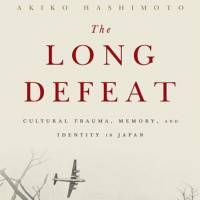In "The Long Defeat," Akiko Hashimoto explores how Japan's World War II loss has been remembered. More sociologist than historian, she does this by looking beyond political speeches and newspaper editorials and examines how memories manifest in the media, in classrooms and in the home.
The Long Defeat, by Akiko Hashimoto
208 pages
Oxford University Press, Nonfiction.
Hashimoto has gathered testimonies from studies, memoirs and documentaries, and presents subjects in their own words. While some from that generation have chosen silence, others speak to their children and grandchildren about the event in the hope of preventing another war. Stories of divisions and rapprochement across the generations are heartbreaking — all the more for being private. We rarely see scenes such as these.
Hashimoto argues for a nuanced understanding of defeat, particularly in relation to the West's idea that Japan has failed to adequately acknowledge its past. She argues that Japanese culture developed independently of the Judeo-Christian ideology, with its focus on confession and public repentance, and that demanding one culture abides by the traditions of another is a form of colonialism. However, she accepts that the West's ideology is the dominant narrative in geopolitics today: Like it or not, these are the rules of the game.
Written in clear, thoughtful prose, the central theme of this book is the plurality of responses to the war. Hashimoto resists simplifying the situation to sound bites. "The Long Defeat" shows that though Japan's history has been "centralized by the state," cultural fragmentation ensures no group can control the narrative for long.

















With your current subscription plan you can comment on stories. However, before writing your first comment, please create a display name in the Profile section of your subscriber account page.